Meet Nirmala, she made your clothes, but there is more to her than that
By Melanie DiSalvo
Nirmala is a khadi weaver at WomenWeave in Maheshwar, a small village in the Indian state of Madhya Pradesh. A state infamous for its mistreatment of women. She lives across the street from the weaving unit she works at. She shares a 400 square foot apartment with her husband, two children, mother in law and father in law, brother in law, sister in law and their two children – 10 of them total. Nirmala’s apartment has tile floors. Many of the floors of the other weaver’s homes are made out of a cow dung paste that needs to be reapplied about once a month.
The apartment is split into four small rooms. Three bedrooms, one for each family unit and a kitchen with a small shrine in the corner. There is a small gas burner where all the meals are prepared, two giant jugs of safe water to drink, and on the floor in front of the shrine, is where the food is served.
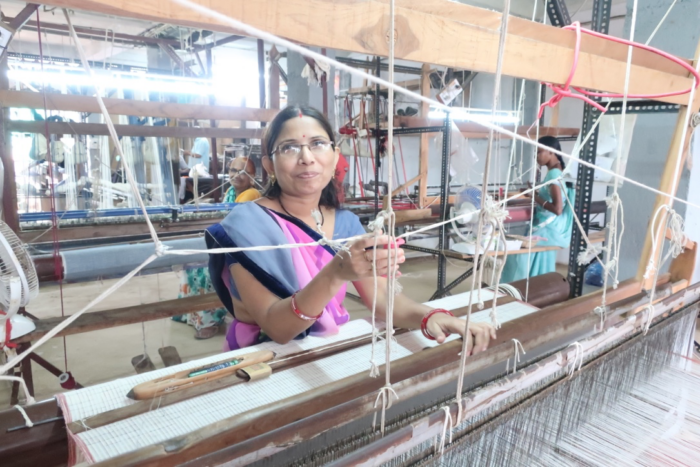
Each room is multipurpose and acts as a living room, bedroom, and communal room. The first room has 2 beds right next to each other, this room has a giant fan that is meant to cool the entire house. Temperatures can reach up to 100 degrees. The second room only has 1 bed, which 4 of them share. They also keep their clothes here, they are stacked and dangle from a laundry line strung across the room. And the third room is for the grandparents it’s the smallest, large enough for only a bed and dresser. There is one small 3 foot by 3-foot shower room, this is also where the laundry is scrubbed, and next to it a room with a squat toilet that all 10 of them share, with a sink on the outside.
The nuclear family is an important part of Indian culture, extended families work together to help make ends meet, raise children, and assist one another. These living arrangements are normal. Many Indian’s do not have enough resources to survive any other way. Although there are separate rooms where each family sleeps everyone is free to go wherever they want in the small home. Privacy is nonexistent.
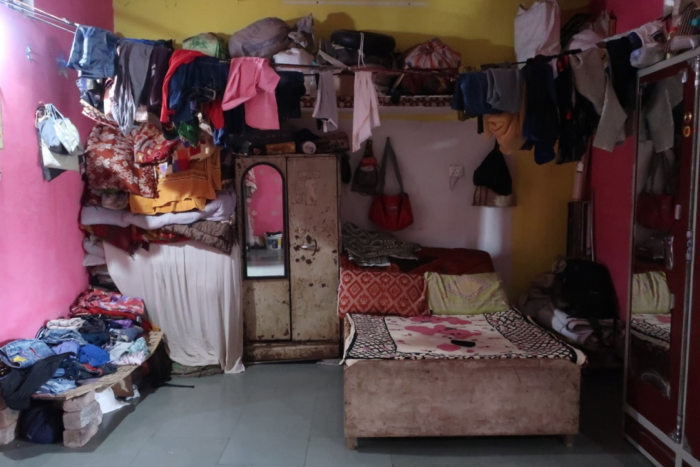
Nirmala and her family start their day with chai. She then cooks food for the day – rice, dal, and chapatti. This will be their breakfast, and their lunch, the meal prep takes a little over 1 hour. She takes a small piece of dough made of water and wheat, rolls it in her hands, flattens it with a rolling pin, and then throws it in a pan that resembles a wok. She does this again and again, making enough chapatti for the day for all 10 members of her family. For dinner, sometimes they will have the same meal as lunch and breakfast, or sometimes vegetables are prepared. Like most Hindu’s her family is vegetarian.
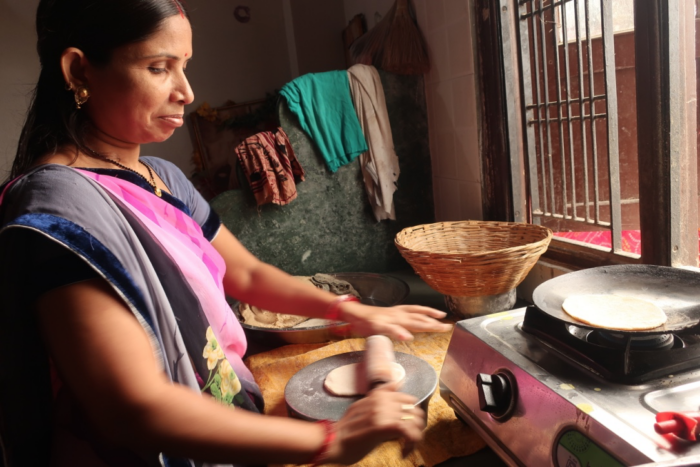
On one of her hands is a tattoo of the ohm symbol. She got it 10 years ago at a tattoo festival, and now it is faded and resembles a stamp you might get for entrance into a club. Children as young as 11 get stick and poke tattoos here. She is amazed by my high detail single needle tattoo and can’t believe that it’s real. She wants to know why my nose ring is on the right side instead of the left like hers. I explain that it’s for style. In India, generally the nose is pierced in the left, it is believed that this will aid in childbirth. While she dons the traditional sari, bindi and yellow gold earrings, she allows her children to wear western clothing. Although she herself is not comfortable in them, she is proud that she can afford to dress them in such high-quality fashion.
Nirmala’s family were not traditionally weavers – they are Gaari Samaj, the agricultural cast. Years ago the family sold all their land after her husband’s grandparents had 5 girls. Knowing that their daughters would be married into new families leaving no one to take care of the land the grandparents sold it all and bought a few cows in hopes to sell the milk. In Indian culture, the man is the center of the nuclear family, Nirmala and her sister in law both left their families to join their husband’s. In a twist of fate, after the land was sold two boys were born. Now the family works odd jobs to make ends meet.
Nirmala’s husband owns a paan shop. Paan comes in a leaf and traditionally it contained betel leaves, but tobacco is also popular. Nirmala’s sister in law is a school teacher, today she sits on the floor coloring in a book. There are no pre-made books or education tools in the village. She makes her own picture books in her free time to teach the children reading skills.
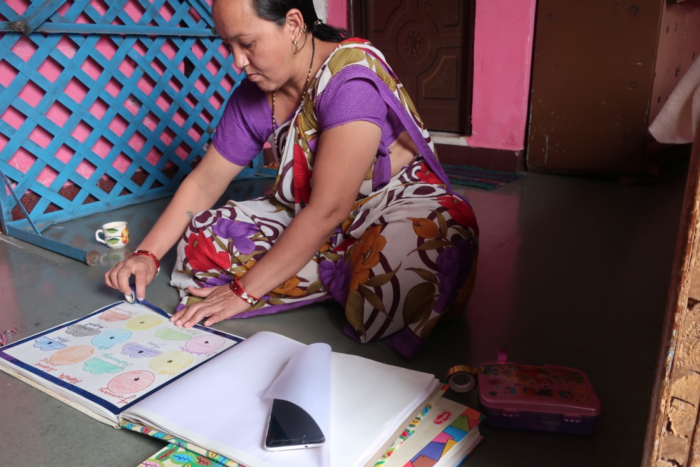
Once the meals for the day are prepped and the children are sent off to school, around 10 am, Nirmala walks across the street to WomenWeave. Each weaver is given her own loom, there are about 30 of them on the second floor of the unit where she sits. Her work begins by brushing off any dust that may have accumulated from the night before. She sits down on her bench and beings to weave.
Her arms pull a rope back and forth that moves a wooden shuttle across the loom. The shuttle holds the warp yarns. While she does this her feet push two petals, one at a time to the tempo of the shuttle. The peddles control the loom reeds, each read has one yarn that passes through it, and they are configured in different patterns, these patterns determine what the fabric will look like. The rhythm is methodic, constant and soothing. Hand weaving is considered a mindful meditation, like knitting, or adult coloring books.
Nirmala and the other women wear saris from the local market in bold bright colors. The fabrics they wear are cheap and were made on industrial power looms for the mass market. They cannot afford to make saris out of the fabrics that they themselves weave. They tell me they have never actually seen someone wearing the fabric that they make, but the imagine foreign women that look like me from Europe are the ones that end up with it.
Nirmala only pauses to fix broken yarns or the tension on her machine. The process continues until 1 pm when there is a lunch break for one hour.
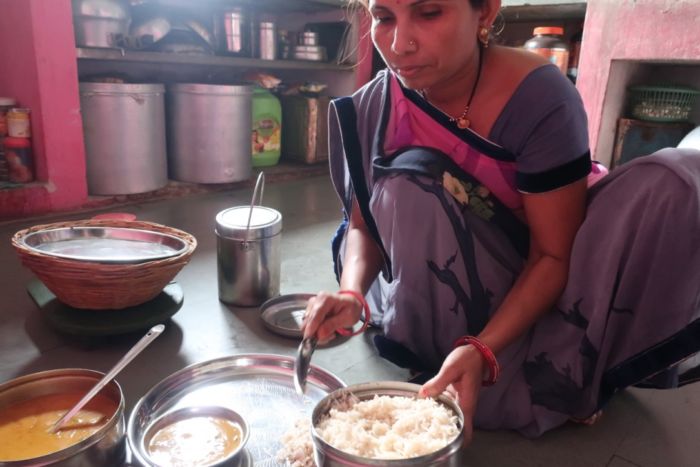
Many of the women in the unit bring food from home and eat there because Nirmala lives so close she takes her meals at home. She has the same as breakfast, rice, dal, and chapatti.
After lunch, she returns back to her loom where she will continue to weave until 6 pm.
To women like Nirmala, this job has given them freedom and peace of mind. They know that they are able to provide for their families. Her job is a highly sort after position, every month 15 women approach WomenWeave and ask for jobs. The only time jobs ever really open up is when the company is growing. The only time women leave is when they are married off to another family, too old, or pregnant and cannot work.
And why would they leave? They earn good money, their health is taken care of, their children’s school is paid for, and they feel safe working in an all women’s space.
Nirmala does this job so she can provide an education for her children. Education is very important to her because she was not able to get one. Her eldest son is now enrolled in a local college learning Business Communications. He hopes to become a bookkeeper. He is also learning computer programming, although there is not much of a future in it. In India, the starting salary for a computer programmer is $5000 USD a year.
The hour’s tick by and Nirmala continues to weave, stopping only for a chai break. She enjoys her work. When I ask about the favorite part of her life, she says it is their job. At first, I think she was told to say this, but then we discuss the answers further, it is apparent she means it. Nirmala like the other women in the unit really does look forward to coming to work and weaving. For many of them, they are single mothers, their husbands dead, or they are the main breadwinners for their family. They are proud that they are able to do the job that traditionally society dictated a man do. Being self-reliant gives them pride and purpose. Their jobs make them feel dignified.
In India, many women are not as lucky as Nirmala. They are not allowed the opportunity to work, nor do they want to. For safety reasons, working alongside men is discouraged and even forbidden by family patriarchs. Because the unit is women only, husbands are happy to allow their wives to work because they are confident in their safety. The women are grateful for this type of safe space to work in compared to other options.
Many of them came from agricultural farms where they were forbidden to speak for 8 hours a day as they picked crops under the hot Indian sun. Women that work these jobs end up with cataracts and going blind, unable to afford the $20 USD surgery that could restore their sight. In their old photos, where they smiled for the occasional tourist, you would never be able to tell the mistreatment they endured. Now they are grateful to work in shade, be allowed breaks, and most importantly that they are allowed to socialize with other women and not live in isolation.

Nirmala and the other women explain that one of the best parts of their jobs in the friendship they make, and the community they are a part of. For them, their work is not just a job, but also their social life. As westerners, we often live two lives, our work life, and our private life. For the weavers of Maheshwar, there is no difference between the two. Their job is where they go to be with their friends and earn a living. They are a different kind of family.
A lot of kids grow up on the unit. When the financial conditions at home are not good, the women bring their kids to work, and all the women help to look after them. One weaver in the unit had 7 daughters in hopes of having a son. All of her girls were brought up in the unit with the help of the other weavers.
At 6 pm Nirmala returns home, proud of the work she did. It takes all day to weave only three meters of fabric. When fabrics are complex sometimes it takes the entire day to weave only a meter and a half.
The work of a weaver is slow, and traditionally men have been the ones sitting at the looms. In many khadi supply chains, there is a dark secret of unpaid labor. Women in traditional weaving families have long been expected to do all of the prep work, a total of fourteen steps, completely unpaid. The ready loom is then handed over to the men in the family who do the weaving and are the ones that earn a salary. The women are left dependent on men for financial security. This is not the case where Nirmala works.
When I ask what is her favorite things she has woven she cannot answer. When you spend so much time creating each fabric, you grow attached to it, every fabric is her favorite, and she hopes the person that ends up wearing knows the care she put into making it.





